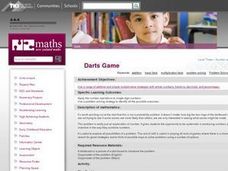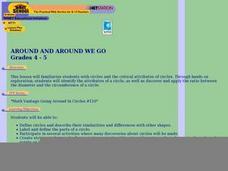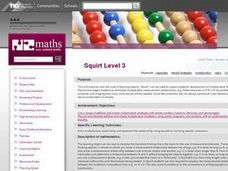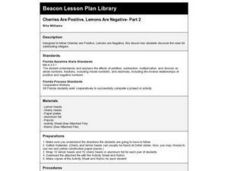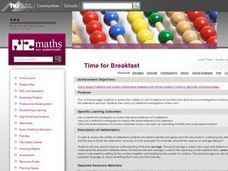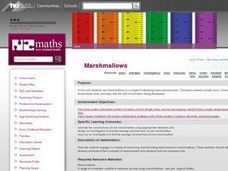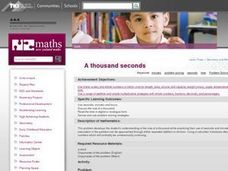Curated OER
Revamped Recipe
Fifth graders engage in a tasty lesson which assist them with proportional measurements. They use a given recipe written for 12 servings, and use a chart to determine the ingredient amounts for 30 servings (or number of students in class).
Curated OER
Integer Arithmetic
Students solve integer-based problems. They add and subtract integers as well find missing integers. They represent a scenario involving positive and negative integers and solve it.
Curated OER
Take Away Bar 2
Students use an Internet tool, The Take-Away Bar" to solve subtraction problems. They use mental strategies to subtract a two-digit number from a larger two-digit number. Students write and solve subtraction problems. They describe...
Curated OER
Aldridge Sawmill -- The Story in Numbers
Seventh graders view a recent transparency of the average rainfall zones of the state of Texas. Using another transparency, they identify the Piney Woods subregion of the Gulf Coastal Plain and locate national forests and sawmills. ...
Curated OER
Complexity
Students perform mathematical operations on complex numbers. After a lecture/demo, students utilize a worksheet imbedded in this plan to gain practice performing operations on complex numbers.
Curated OER
Darts Game
Third graders attempt to determine what the scores of the game in the problem could be. They work with basic multiplication facts to justify the solutions to a dart game and share all of the possible scores.
Curated OER
Around and Around We Go
Fourth graders discover that a polygon is a closed figure formed by line segments, and that the perimeter of a polygon is the sum of the lengths of its sides. They utilize a worksheet imbedded in this plan to gain lots of practice with...
Curated OER
Pyrotechnics
Students discuss pyrotechnics and what they have noticed about their height and speed. They think about the path which fireworks follow which is a parabola. They follow multiplication patterns to determine the Zero Product Property and...
Curated OER
Squirt Level 3
Students use the instructional activity, "Squirt", to support students' development of multiplicative thinking. Squirt encourages students to anticipate multiplicative measurement relationships, e.g. three measures of A fit in B, by...
Curated OER
Lollies, Lollies, Lollies
Learners listen to the problem read to them. They answer some simple questions using number sentences. They then compose a written record of the solution and share their approaches used.
Curated OER
Adding Ten Tiles I
Students practice this problem that needs a certain amount of experimentation (trial and error) to get any answer at all. In the process they practice their basic number facts. However, to get the complete set of answers Students need to...
Curated OER
Making a Brain: Aritifical Neural Network
Students explore how the brain works. For this nervous system lesson, students create a network of "neurons" to simulate how the nervous system and the brain work together.
Curated OER
Words, Words, Words
Second graders choose estimation strategies in real-world problem situations and explain the choice. They work in groups of five using three different estimation methods to find out how many words are on a page of text.
Curated OER
students rotate through four workstations that reinforce the concept of symmetry
Second graders, in pairs, use arrays to explore the relationship between multiplication and division.
Curated OER
Cherries Are Positive, Lemons Are Negative- Part 2
Third graders, in groups, subtract integers by following Cherries are Positive, Lemons are Negative. They discover the rules for subtracting integers by using cherry heads and lemon heads.
Curated OER
Million Dollar Gift
Third graders create a box big enough to hold a million dollars. This is a project fun to do near the winter holidays with inexpensive gifts included in the boxes. This hands-on lesson very effectively demonstrates the concept of volume.
Curated OER
Fraction King Lesson Plan
Learners combine imagination, block manipulation, and computer applets to investigate fractions.
Curated OER
Time For Breakfast
This unit encourages students to assess the validity of a set of statements and then plan and carry out investigations to find out whether the statements are true. Students then carry out statistical investigations of their own.
Curated OER
Marshmallows
Third graders estimate the volume and mass of one marshmallow using appropriate standard units. They design and carry out an investigation to find the average of volume/mass of one marshmallow.
Curated OER
A thousand seconds
Pupils use seconds, minutes, and hours. They then discuss the size of a thousand. After that they read time in digital or analogue form.
Curated OER
My Dogs
Students use the properties of multiplication to solve problems. They recall the basic multiplication facts as well as write and solve problems that involve whole numbers.
Curated OER
Gulls
Students listen to the problem and think about the first question and the number operation that they would use and explain. They work in pairs and record their solutions so that they can be displayed and shared.
Curated OER
Basketball Caps
Students work on a problem, individually or in pairs. They are asked questions that focus on average. They discus that the average number represents an equal redistribution , rather than just being able to state the rule. They write...





